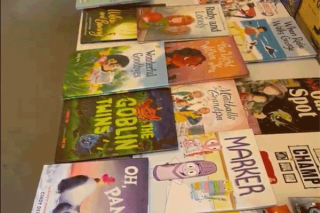Interview edited for length and clarity.
How did you hear about Simmons, specifically about the Children’s Literature Program?
When I was an undergraduate student at Oberlin College, I majored in English and French, with a minor in history. Through a French linguistics class, I was analyzing a picturebook as a case study. I found it to be interesting, and at that point, I was also doing a thesis project on French feminist fairy tales of the 17th century. These experiences brought me into the realm of children’s literature and got me interested in it as an academic study. I was also getting to the end of my undergraduate program and thinking about what my next step could be.
As I considered graduate school, I started research, and when I thought of children's literature as a focus, I found that there aren't many children's literature programs in the country. You can more easily find individual courses or concentrations through an education department or something like that, but children's literature as a study by itself — that was special with Simmons (and a handful of other institutions). The program was in Boston as well, which is a great place to be. It was mostly the reputation of the program that got me here.
Do you think living off campus affected your networking and sense of community?
When I started, I think I was one of the youngest people in my program. It seemed that a lot of people would come to Simmons’ children's literature program either mid-profession or maybe sometime after graduating from college. At that time, it was not as typical for somebody to go directly from undergrad to the program like I had.
But my group was really tight-knit. I give much of that credit to the late Susan Bloom, who was the director of the program at the time, and to Cathryn Mercier, who is the current director and was a professor there when I attended. I remember the courses being rigorous, and there were a relatively small number of students in every class, so we really banded together.
Cathie’s literary criticism class was one of my first courses in the program, so it was a positive introduction. We basically all knew each other, and we were lucky to have that sense of community, which I think was cultivated well by the program.
While the graduate programs are co-ed, how did your experience reflect that of a women-centered institution?
It was definitely women-centric. The majority of people in my program (and maybe all of my cohort at the time) identified as female. Having come from Oberlin College, which was a non-gender-hierarchical place, I hadn’t been in many classes that were only women before. And this group of women in the children's literature program really did bond closely. People were coming from different professions and different stages of life. I found it to be a vital place to exchange ideas.
Was there a project you were most proud of in your program?
Since I had chosen to write an undergraduate thesis on French fairy tales, when I got to Simmons, I was in the mindset of fairy tales and folklore and that realm of study, and wanted to continue on that path.
At the same time, I had my mind opened to what children's literature is now and could be. That was a sort of historical mindset that I found fascinating. Looking at books with a sociological and historical mindset allowed me to think more critically about children’s literature.
What advice would you give a student entering the Children’s Literature graduate program?
I think networking is really helpful. There's a lot happening in the field today, especially with the book challenges and book bans, so keeping on top of current events and the industry goes a long way. Knowing who is doing the work and networking locally in Boston, a publishing hub, is important, too.
One job I had in between graduating and getting my role at The Horn Book was for a medical journal. There, I learned how to build a journal. That experience helped me realize that although I didn’t see an immediate connection with that work and my academics, it helped me be better prepared for The Horn Book and come in with some prior knowledge that other students may not have had without work experiences.

